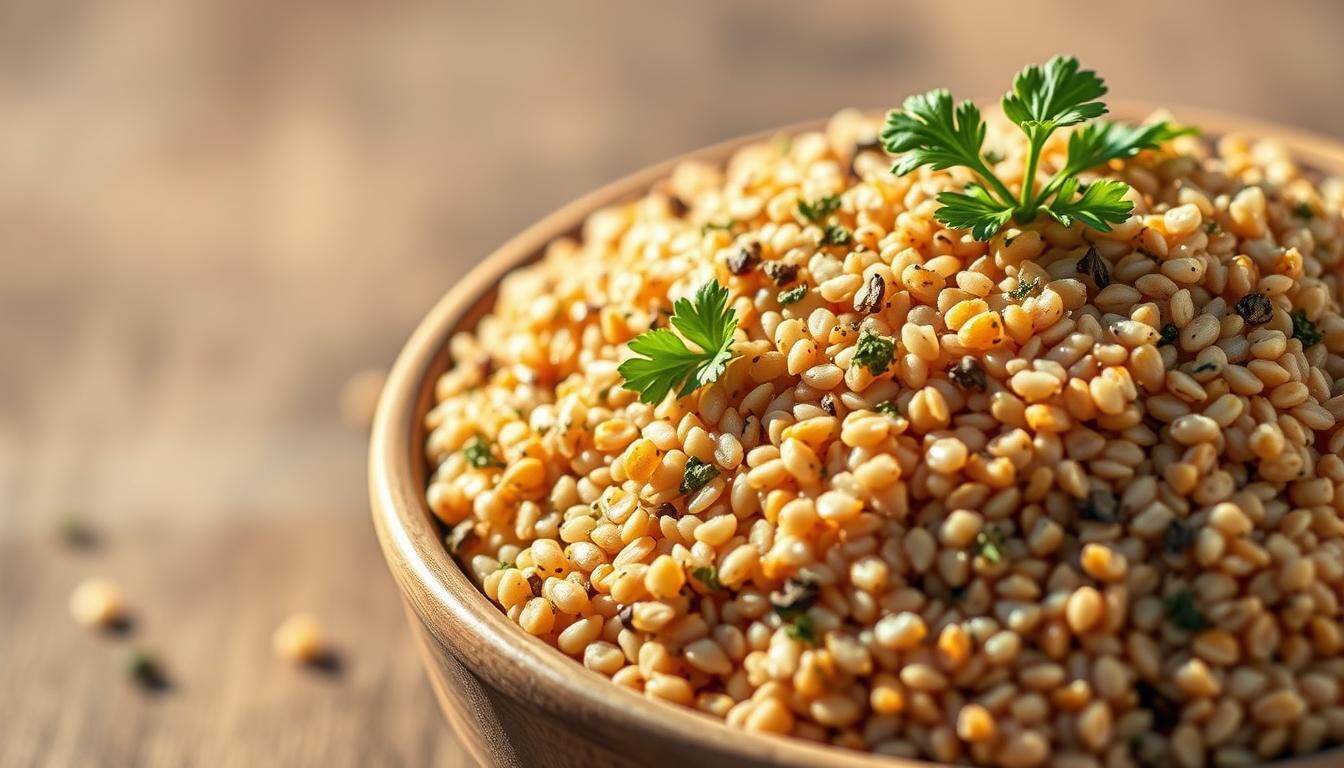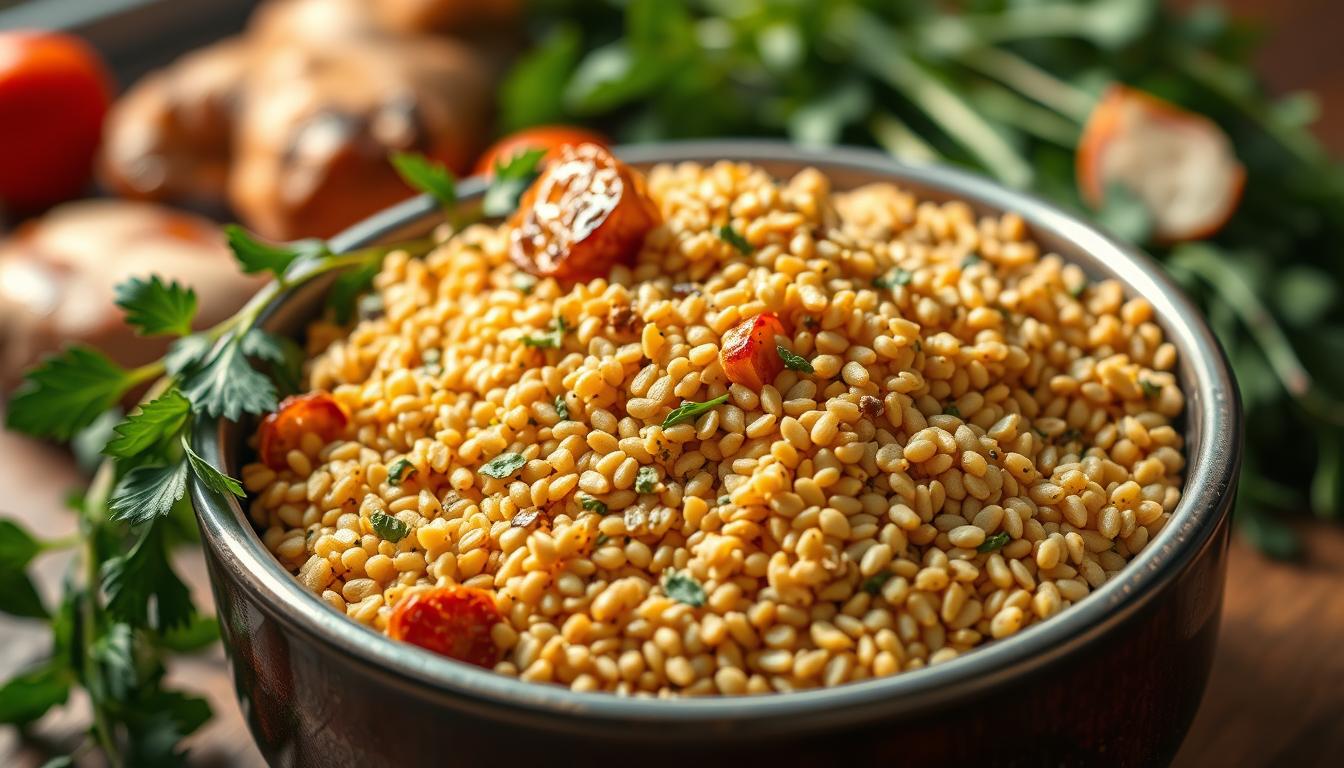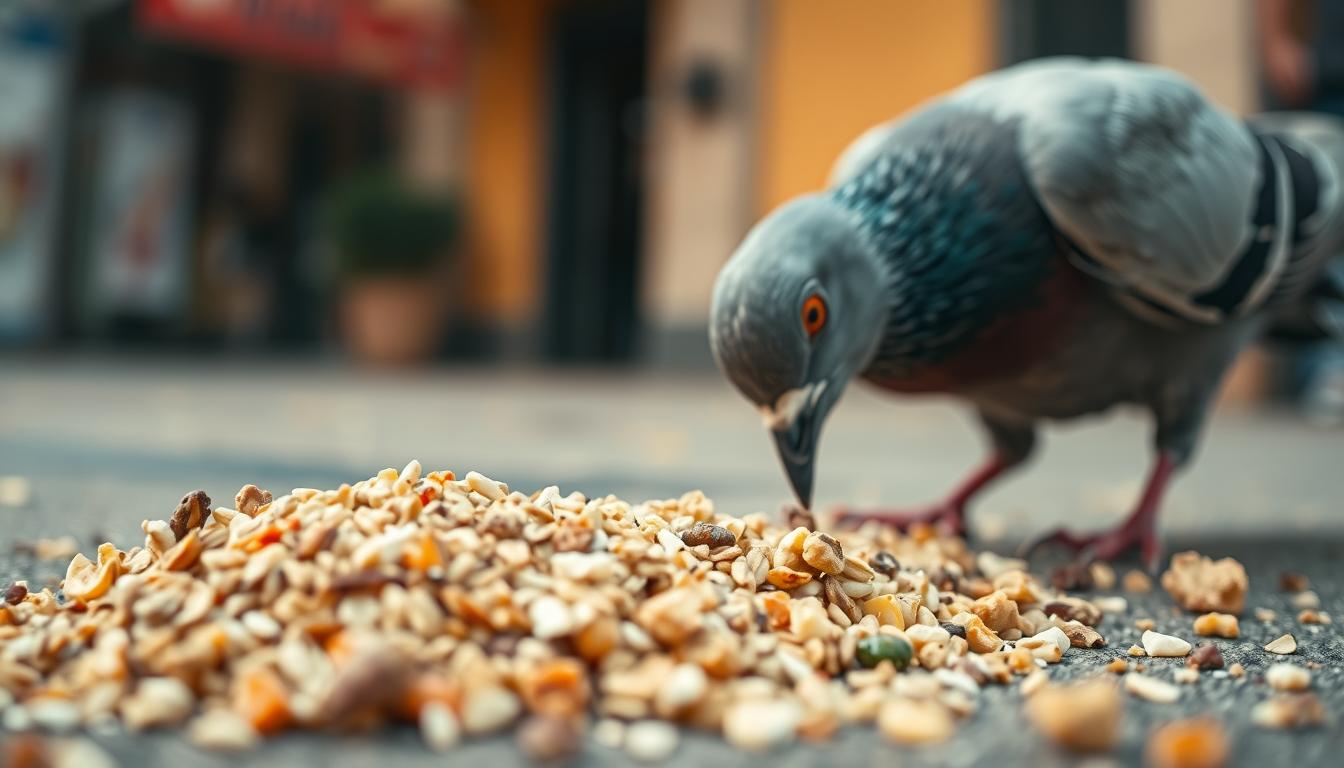Have you ever wondered, “Is quinoa good for dogs?” This superfood, often mistaken for a grain, is actually a seed that offers a wealth of nutrients. Rich in protein, essential amino acids, and fiber, quinoa can be a great addition to your dog’s meals when served in moderation.
Not only is quinoa a human superfood, but it also provides a wide range of health benefits for dogs. With its mix of vitamins, minerals, and carbohydrates, quinoa helps support your dog’s overall well-being. It’s also easy on the digestive system, which makes it a good option for dogs with sensitive stomachs or food sensitivities.
Introducing quinoa into your dog’s diet can enhance their digestion and supply important nutrients that support their health. However, it’s crucial to serve quinoa in appropriate portions to maintain a balanced diet. Always consult with your vet before making any changes to your dog’s feeding routine to ensure it’s the right fit for them.
Table of Contents
Key Takeaways
- Quinoa is a nutrient-rich seed that can be safely fed to dogs in moderation.
- It contains essential amino acids, protein, and fiber, supporting overall health.
- Quinoa is easy to digest, making it a good option for dogs with sensitive stomachs.
- It provides vitamins and minerals that can enhance your dog’s diet.
- Always consult your vet before adding quinoa to your dog’s meals.
How Quinoa Good for Dogs Boosts Your Pet’s Health
Quinoa is more than just a trendy ingredient for humans—it’s a powerhouse of nutrition for your furry friends too. This superfood is packed with essential nutrients that can significantly enhance your dog’s overall well-being.
Key Nutrients and Vitamins in Quinoa
Quinoa is a rich source of vitamins B and E, which play a crucial role in brain function and maintaining a healthy skin and coat. It’s also loaded with minerals like iron, calcium, and magnesium, which are vital for maintaining healthy blood cells and bone structure.
Essential Amino Acids for Muscle Health
One of quinoa’s standout features is that it contains all nine essential amino acids. These amino acids are crucial for building and repairing muscles, making quinoa an excellent ingredient for supporting your dog’s muscle health and energy levels.
Fiber Benefits for Digestion
Quinoa is high in dietary fiber, which helps promote healthy digestion. A fiber-rich diet can prevent intestinal issues and ensure your dog’s digestive system runs smoothly. This makes quinoa a great option for pets with sensitive stomachs.
As a nutrient-dense alternative to traditional grains, quinoa offers a balanced mix of carbohydrates, proteins, and fiber, making it an excellent addition to your dog’s diet. Always remember to introduce it gradually and in moderation to avoid any digestive upset.
Preparing Quinoa Safely for Your Dog
Preparing quinoa for your dog involves a few simple steps to ensure it’s safe and healthy. Proper preparation is key to making this superfood a beneficial addition to your dog’s meals.
Proper Cooking and Preparation Methods
Start by rinsing the quinoa under cold water to remove saponin, a natural coating that can give it a bitter taste. Cook quinoa as you would for yourself—using water or a low-sodium broth. Never add salt, garlic, or onions, as these can harm your dog. After cooking, let it cool completely before serving.
Recommended Portion Sizes by Dog Size
The right amount of quinoa varies by your dog’s weight. Small dogs (under 20 pounds) can have 1-2 tablespoons, medium dogs (20-50 pounds) can have 1/4 cup, and large dogs (50-80 pounds) can have 1/3 cup. For extra-large dogs (over 80 pounds), 1/2 cup is appropriate. Always introduce quinoa gradually to prevent digestive upset.
Before adding quinoa to your dog’s diet, consult your vet to ensure it’s a good fit. You can mix it with dog-safe ingredients like chicken or pumpkin for variety. Watch for any signs of sensitivity or reaction after feeding quinoa.
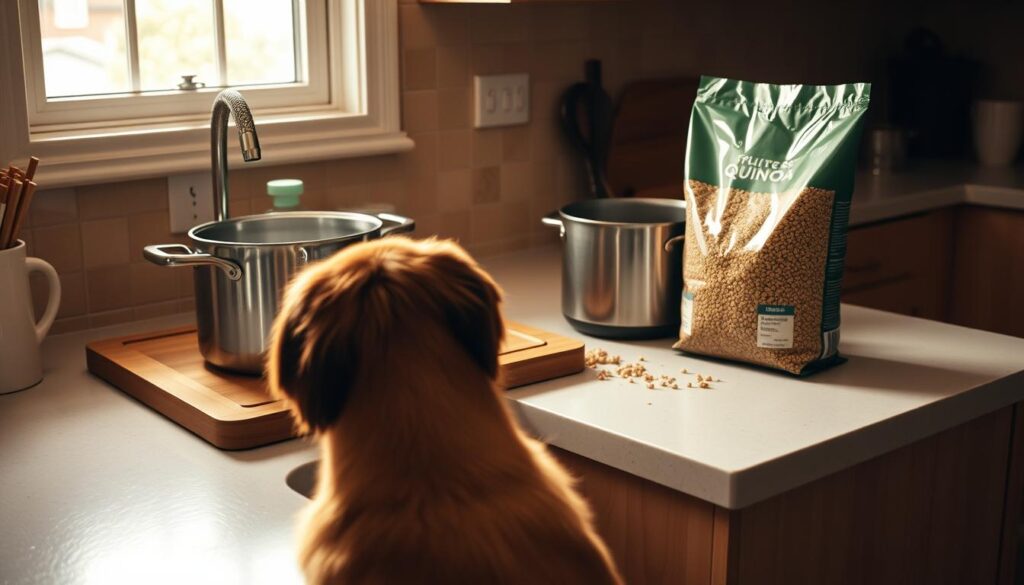
Incorporating Quinoa into a Balanced Dog Diet
Adding quinoa to your dog’s meals can be a fantastic way to enhance their nutrition. This versatile ingredient pairs well with various dog-safe foods, making it easy to create balanced and delicious meals for your pet.
Pairing Quinoa with Other Dog-Safe Foods
Cooked quinoa can be mixed with lean proteins like chicken or turkey for a protein-packed meal. You can also combine it with dog-safe vegetables such as pumpkin or carrots for added fiber and vitamins. These combinations not only provide essential nutrients but also ensure your dog’s diet remains varied and engaging.
- Mix cooked quinoa with plain, cooked chicken or turkey for a protein-rich meal.
- Combine quinoa with steamed, plain vegetables like pumpkin or carrots for added fiber.
- Add a small portion of quinoa to your dog’s regular kibble for a nutritional boost.
Many premium dog foods now include quinoa as a healthier alternative to traditional grains like wheat or soy. This trend reflects the growing recognition of quinoa’s nutritional benefits for dogs. Always ensure that any new ingredients you introduce are dog-safe and free from harmful additives.
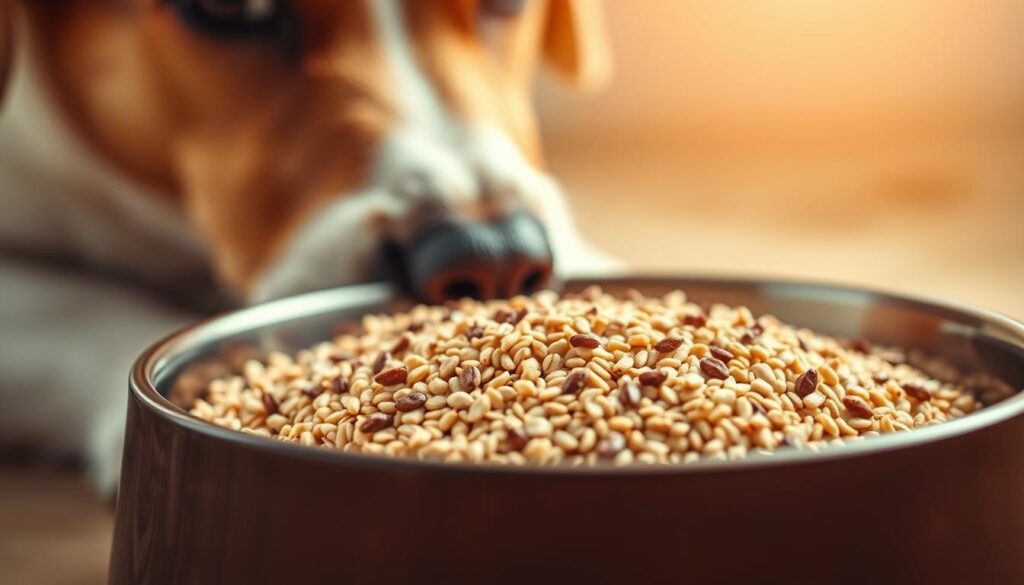
When integrating quinoa into your dog’s diet, start with small amounts and gradually increase their portion size. This approach helps prevent digestive upset and allows your dog to adjust to the new ingredient. Always consult your veterinarian before making significant changes to your dog’s meals to ensure it aligns with their specific health needs.
Conclusion
In conclusion, quinoa can be a valuable and nutritious addition to your dog’s diet when prepared and served correctly. This protein-rich seed provides essential amino acids, fiber, and vital minerals like iron and magnesium, supporting muscle health and digestion. However, moderation is key—serve it in appropriate amounts based on your dog’s size and always cook it without added seasonings to avoid potential sensitivities.
Before introducing quinoa, consult your vet to ensure it suits your dog’s specific health needs. You can mix cooked quinoa with plain proteins or dog-safe vegetables for a balanced meal. Start with small portions and gradually increase to prevent digestive upset. With proper preparation and moderation, quinoa can enhance your dog’s overall well-being, offering a nutrient-dense alternative to traditional ingredients.
FAQ
What are the benefits of quinoa for dogs?
Quinoa is a nutrient-rich ingredient that provides essential amino acids, magnesium, iron, and potassium. It supports muscle function, digestion, and overall health in dogs.
Can dogs eat quinoa without any issues?
Yes, most dogs can eat quinoa. However, it’s important to cook it properly and introduce it in small amounts to avoid any sensitivity or reaction.
How should I prepare quinoa for my dog?
Cook quinoa thoroughly without adding salt, oils, or seasonings. Plain, cooked quinoa is the safest and healthiest option for your pet.
What is the recommended amount of quinoa for dogs?
The portion size depends on your dog’s size and diet. Start with a small amount, such as 1-2 tablespoons for small breeds and up to 1/4 cup for larger dogs, and adjust based on their needs and your vet’s advice.
Is quinoa a good source of protein for dogs?
Yes, quinoa is a complete protein, meaning it contains all essential amino acids. This makes it an excellent addition to your dog’s diet for muscle health and energy.
Can quinoa help with food sensitivities in dogs?
Quinoa is a single-source ingredient and less likely to cause reactions compared to grains like wheat. However, every dog is different, so monitor your pet’s response closely.
Does quinoa provide any specific minerals for dogs?
Quinoa is rich in magnesium, calcium, and phosphorus, which are vital for bone health and overall bodily functions in dogs.
Can I use quinoa as a replacement for my dog’s regular food?
Quinoa should be part of a balanced diet but not the sole ingredient. Pair it with other dog-safe foods to ensure your pet gets all necessary nutrients.
Should I consult my vet before adding quinoa to my dog’s diet?
Yes, it’s always best to consult your vet, especially if your dog has specific health conditions or allergies. They can help determine the right amount and ensure it fits your dog’s dietary needs.

